Root beer extract is a common ingredient in many recipes, adding a unique and subtle sweetness.
If you’re looking for a quick alternative to root beer extract or out of root beer extract or just looking for a different flavor, you’ve come to the right place.
However, it can be hard to find and sometimes expensive. So, if you don’t have any on hand or can’t access it easily, then try my favorite 14 Root Beer Extract Substitutes that will do the trick!
Let’s get started!
In short, "What can I use instead of root beer extract?" Vanilla Extract, Cinnamon Extract, Ginger Extract, Clove Extract, Anise Extract, Maple Syrup, Molasses, Brown Sugar, Honey, Agave Nectar, Licorice Extract, Allspice, Cardamom, Malt Syrup.
What is root beer extract, and what does root beer extract taste like?
Root beer extract is a concentrated sweet syrup that is used to make root beer, a frothy and bubbly beverage that has been popular in North America since the mid-1800s.
Root beer extract is made from the bark, roots, and berries of sassafras trees, which are native to North America. The extract is known for its unique flavor combination of licorice and wintergreen.
Root beer extract is an alcohol-free flavoring agent used to make root beer. It is made from a concentrate of the root bark, berries, and other plant parts of certain varieties of the sassafras tree.
The flavor of root beer extract has a strong licorice-like taste with notes of wintergreen and spices such as clove, nutmeg, and cinnamon. It also has some sweetness to it as well.
Root beer extract can be used in cooking or for making homemade sodas.
what are the Uses of root beer extract?
Root beer extract can be added to seltzer water or brewed with yeast to make traditional root beer from scratch.
It is also used as a flavoring in baked goods like cakes and muffins, as well as in frostings and glazes for an unmistakable root beer flavor.
Root beer extract can even be added to sauces and marinades for meats like pork chops or ribs for an unexpected twist.
The concentrated syrup form of root beer extract also makes it a great addition to cocktails, giving them a distinctively creamy, subtly sweet taste with notes of spice and licorice.
Mixed with sparkling white wine, it creates a refreshing sparkling spritzer.
When added to vodka or whiskey-based cocktails, it adds depth of flavor without making the drink overly sweet or cloying.
Root beer extract is not only versatile but has also been suggested to have medicinal properties due to its natural ingredient content.
Including safrole – an aromatic compound long believed to possess antibacterial and anti-inflammatory properties when consumed orally in small doses.
Best Root Beer Extract Substitutes
1. Vanilla Extract
This is a great substitute if you’re looking for a milder flavor than root beer. It won’t give you the same sweetness, but it does add a nice background flavor.
To substitute, add 1 tablespoon per cup of liquid.
2. Cinnamon Extract
Just like vanilla extract, this will provide a more subtle flavor than root beer extract but adds a nice warmth and spice to your recipe.
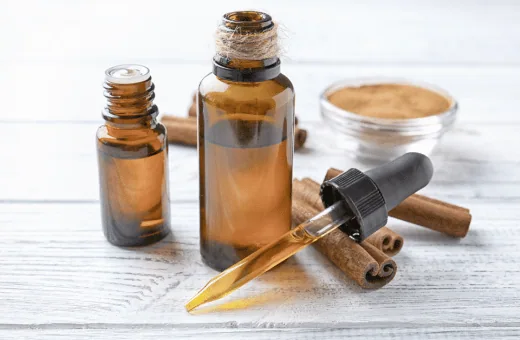
To substitute, add 1/4 teaspoon per cup of liquid.
3. Ginger Extract
This is an excellent choice to create an interesting twist on the traditional root beer flavoring.
The ginger adds a hint of heat and complexity that really stands out in baked goods and other recipes calling for root beer extract.
To substitute, add 1/4 teaspoon per cup of liquid.
4. Clove Extract
Clove can be used as an alternative to root beer extract when making desserts such as cakes and pies.
Its warm, spicy notes pair well with other flavors like cinnamon and nutmeg, creating an interesting depth of flavor that complements any sweet treat nicely.
To substitute, add 1/8 teaspoon per cup of liquid;
5. Anise Extract
Anise extract has a licorice-like taste that makes it perfect for enhancing the sweetness in baked goods like cookies or muffins without overpowering them with too much sugariness from the root beer extract itself.
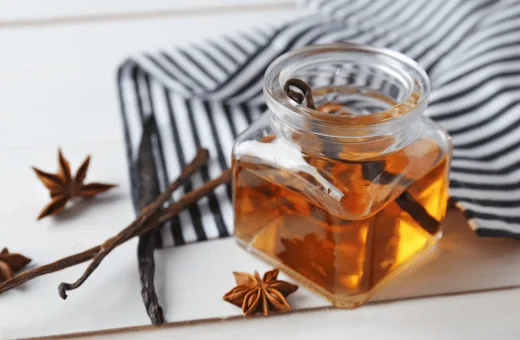
It also helps give these treats a more complex flavor profile without being too overwhelming on their own.
To substitute, add 1/4 teaspoon per cup of liquid.
6. Maple Syrup
If you’re searching for something sweeter than traditional root beer extract, maple syrup is definitely worth trying out!
Its rich flavor pairs wonderfully with many other ingredients in desserts like brownies or pancakes and can help create some truly delicious treats!
To substitute, add 2 tablespoons per cup of liquid.
7. Molasses
Molasses has been used in baking recipes since way back when and is still popular today due to its unique taste and consistency—not to mention how it can help enhance the sweetness in many recipes without being overly cloying or heavy on its own!
Plus, it’s great for adding depth and richness to dishes like barbeque sauces or even marinades! To substitute, add 2 tablespoons per cup of liquid;
8. Brown Sugar
Brown sugar is great because it adds both sweetness and complexity to recipes without overpowering them with too much sugariness from the root beer alone.
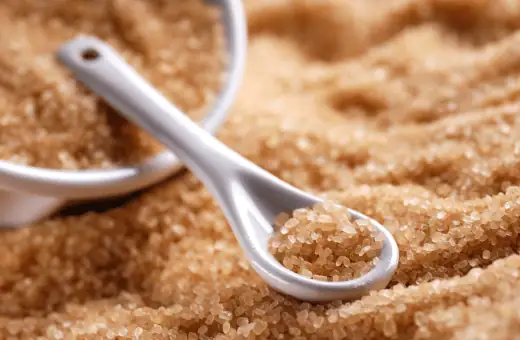
Plus, its caramel-like notes can really help bring together flavors like chocolate or molasses perfectly!
To substitute, add 3 tablespoons per cup of liquid;
9. Honey
Honey has been used in baking recipes since ancient times due to its natural sweetness that pairs so well with many different ingredients.
It’s especially good at adding just enough sweetness without being cloyingly sugary like some extracts can be!
Plus, honey also has antioxidant properties which make it great for healthy cooking too!
To substitute, add 2 tablespoons per cup of liquid;
10. Agave Nectar
Agave nectar has become increasingly popular lately due to its low glycemic index, which makes it ideal for those who are conscious about their consumption of added sugars.
Plus, agave nectar also has a smooth texture which makes it ideal for adding subtle sweetness without making things overly sweet either!
To substitute, add 2 tablespoons per cup of liquid;
11. Licorice Extract
This is a great option if you’re looking for something with an intense flavor and aroma like root beer extract has.
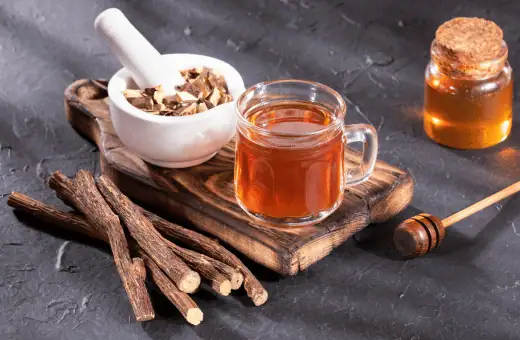
You can substitute licorice extract for root beer extract at a 1:1 ratio; however, keep in mind that it may have an aftertaste that some people don’t like.
12. Allspice
Allspice has a sweet, spicy flavor with notes of clove, which makes it perfect for adding a subtle sweetness to baked goods or savory dishes.
When substituting allspice for root beer extract, use ¼ teaspoon of allspice for every ½ teaspoon of root beer extract required by your recipe.
13 . Cardamom
Cardamom is known for its distinct sweet and slightly floral taste, making it perfect as an alternative to rootbeer extracts when creating desserts like cakes or cookies!
Use ¼ teaspoon of cardamom per every ½ teaspoon required by your recipe as a substitution instead!
14 . Malt Syrup
Malt syrup is known for its intensely sweet taste, which makes it perfect as an alternative when creating desserts such as cakes or cookies needing a milder sweetness than molasses but more depth than sugar alone would give!
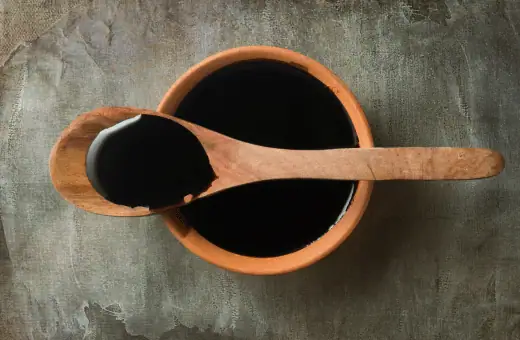
For each ½ tsp needed in your recipe, use 2 tsp malt syrup instead!
Best Root beer extract Substitutes
Homemade Root beet extract
Homemade Root beet extract is a great way to get the same beneficial nutrients and minerals as store-bought root beet extracts without the added sugar, preservatives, and high cost.
Making your own root beet extract requires minimal ingredients and preparation time, making it an affordable and convenient option for many people.
This homemade root beet extract can be added to smoothies, juices, teas, baked goods, and more to boost nutrition and flavor. Enjoy!
How to make root beer extract
To begin, select firm beets with no blemishes on the skin or inside. Be sure to scrub them thoroughly before cutting them into cubes or slices about 1/4 inch thick.
Place these pieces in a food processor or blender and add just enough water to cover them. Blend until the mixture is smooth and has a thin consistency that can easily pour out of the container.
Strain the blended beets through a fine mesh sieve, pressing down firmly with a spoon to extract as much of the liquid as possible.
Discard the solids and pour the liquid into a pot or saucepan. Add a few tablespoons of sugar, honey, or agave syrup for sweetness if desired.
Simmer on low heat for about 15 minutes until the mixture has reduced by about half its original volume.
Allow cooling completely before transferring to an airtight container and storing in the refrigerator for up to one week.
Root beer substitute for pulled pork
For a succulent and flavorful pulled pork, substitute root beer with cola. Cola is a deep dark soda that can provide a delicious sweetness to the pork while still allowing all of the spices to shine through.
The caramelized sugars in the cola also help to add another layer of flavor and complexity to the meat.
Additionally, its carbonation helps keep the pork extra juicy as it cooks, providing an extra level of moisture.
If you want an even more unique flavor profile, you can experiment with substituting different types of soda, like cream soda or ginger ale, for a unique twist on traditional pulled pork.
Find out: What is good substitute for coffee extract in recipes?
Where to buy root beer extract?
If you’re looking for where to buy root beer extract, there are a few different places you can go. Many specialty food stores carry it, as do some international grocery stores.
You can also order online from many retailers that provide a variety of diverse flavors and types of root beer extract.
Wrap up on root beer extract substitute
With these 10 quick substitutes for root beer extracts now at your disposal, finding the perfect ingredient to enhance your favorite recipes should be easy!
Whether you’re looking for something similar or completely different from traditional root beer extracts, there’s sure to be an option here that fits your needs perfectly!
So don’t hesitate—to start experimenting today! Happy cooking!
FAQs on root beer extract substitute
Q1. What is similar to root beer extract?
Root beer extract can be replaced with other extracts such as sassafras, birch, wintergreen, anise, and licorice. These extracts combine to create the same flavor profile of traditional root beer, but they will have different levels of sweetness. Other possibilities include herbs like dandelion root and molasses for a unique twist on the classic beverage.
Q2. Can you use root beer instead of root beer extract?
Yes, you can use root beer instead of root beer extract. Root beer is a sweet, carbonated beverage made by fermenting a variety of ingredients like sassafras and wintergreen. Many recipes for baking and cooking call for the flavor of root beer to be imparted through the use of root beer extract.
However, if you don’t have any extract on hand, or if you’d prefer not to use it, you can replace an equal amount of root beer in its place. Just be aware that this substitution will add sweetness and carbonation to a recipe, which may alter the overall taste and texture.
If possible, it’s best to cut back the sugar and other liquid ingredients slightly to compensate for the extra sweetness from the root beer.
Q3. What tastes similar to root beer?
Root beer has a unique flavor that is often described as a blend of wintergreen, licorice, anise, and vanilla. Some might argue that it tastes like a mild version of sassafras tea. Other drinks that have similar flavors are birch beer and sarsaparilla.
All three drinks typically contain the herb sassafras root or the bark from its tree. In addition, all three drinks tend to have a strong herbal undertone with hints of sweetness from honey, molasses, and sugar.
Q4. Is root beer extract the same as root beer concentrate?
No, root beer extract and root beer concentrate are not the same. Root beer extract is a concentrated liquid flavoring that contains some of the oils present in sassafras plants and other natural flavors, while root beer concentrate is a syrup-like mixture of sugars and flavorings that can be used to make homemade soda.
Flavoring extracts are much more concentrated than concentrates, so you will need to use less when making drinks or recipes.

